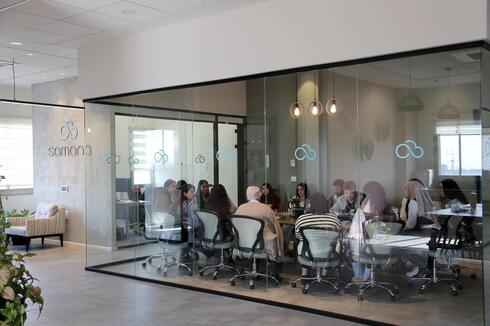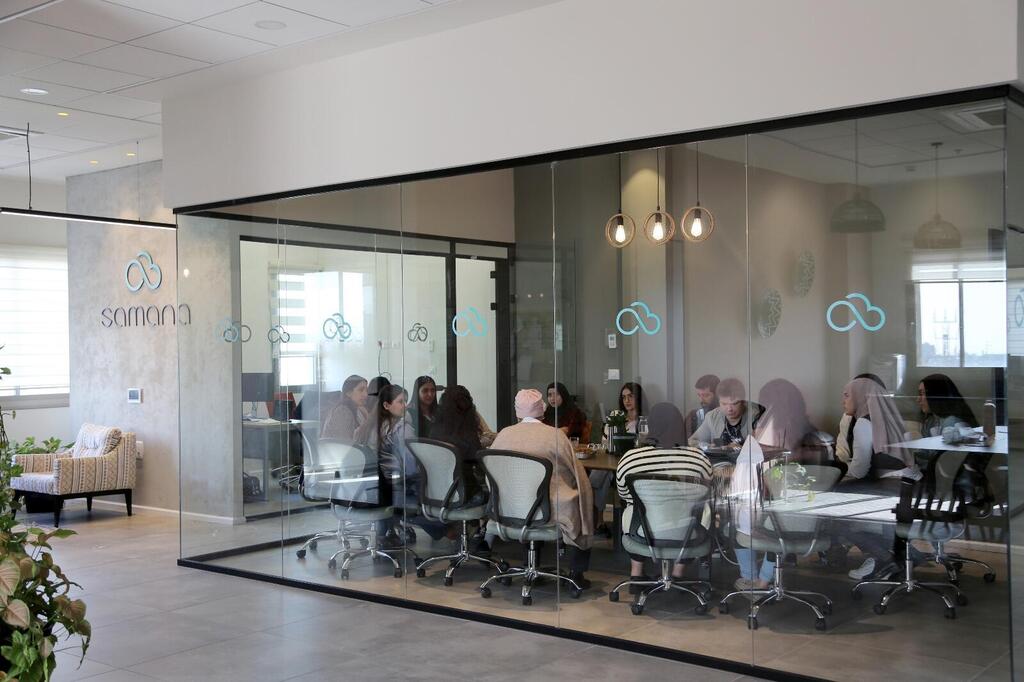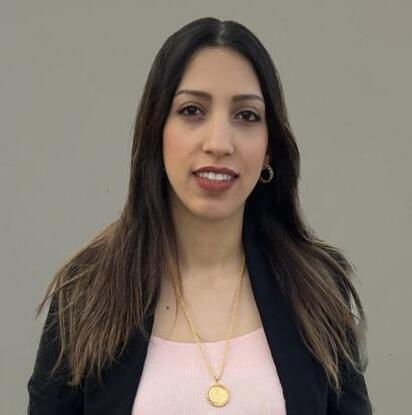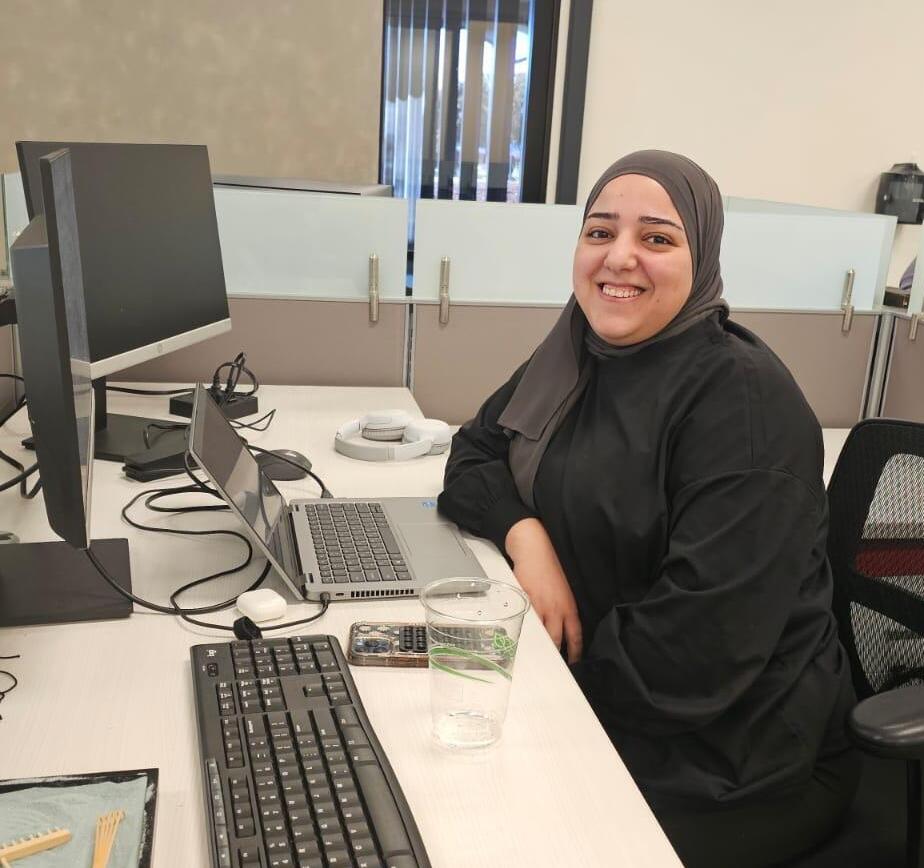
Inside the world’s only tech hub for Bedouin women
Samana, a program founded in 2023, trains Bedouin women in northern Israel for tech careers, providing mentorship, job placement, and a women-only tech hub in Zarzir to overcome cultural and geographical barriers.
Nestled in the Galilee between Nazareth and Haifa, lies the region’s largest Bedouin village, Zarzir. It is also home to the world’s only tech hub and co-working space for Bedouin women, run by a program called Samana. All of the women who meet and work from this space live in the region, residing in nearby villages and work primarily as QA engineers for tech companies.
“I always loved to study,” says Aya Saadia, one of the women who works from the hub in Zarzir. “I dreamed of becoming an engineer and working in tech, but I married very young and they wanted me to be a teacher.” Married at just nineteen, Saadia, now 29, is from Kaabiya, a Bedouin village in northern Israel, close to Haifa, where she lives with her husband and four children. As a teacher, she struggled to find permanent work for about two years. “I worked three jobs including as a tutor. I felt like I needed a career change, and then I met Bushra,” she says.
Bushra Mazareb, a school principal at a school where Saadia worked, is also the CEO and Founder of Samana, a program dedicated to creating quality employment opportunities in high-tech for Bedouin women from northern Israel while respecting cultural sensitivities. Meaning “Our Sky” in Arabic, Samana was founded in 2023 by Mazareb and CTO Rihan Khutba, who herself worked in tech for a decade leading automation. The program trains qualified Bedouin women in an intensive four-month bootcamp, providing them with the professional and soft skills to help them find a job in tech.
Developed in collaboration with tech partners to tailor the training to the needs of the market and specific companies, the first Samana program was built in partnership with SolarEdge who were looking to hire QA engineers. Upon completing the program in 2023, Saadia and the rest of the cohort were hired at SolarEdge.
“The model developed by Portland proves that it is possible, and even preferable, to change the status quo. Instead of recruiting employees from different countries around the world, we bring high-tech to the periphery and connect it with local talent,” says Rami Schwartz, CEO of Portland Israel, a non-profit organization which supports Samana and seeks to increase social mobility among and representation of underrepresented groups in Israeli tech.
“I was in Samana’s first cohort,” says Saadia. “120 girls applied and only 14 were accepted. It was a lot of work - so many exams and tests. I felt like I had a lot to learn, but I had such a desire to fulfill this dream and to get into tech.”
Saadia is one of 60,000 Bedouins living in Northern Israel, primarily in the Galilee. While the majority of Israel’s Bedouin community live in the Negev Desert, where they have historically been nomadic or reside in “unrecognized” villages, northern Bedouins typically live in more permanent housing and are more integrated into greater society. They also have better access to infrastructure, and higher education and employment rates compared to their southern counterparts, including among women.
However, gender norms remain conservative, and women do often face restrictions on education, employment, and social mobility compared to men. With that in mind, Samana’s women-only tech hub in Zarzir was developed to address the unique barriers Bedouin women face to entering the tech industry. While all residents of Israel’s geographical periphery struggle to access the tech industry, which is primarily based in the center of the country, for Bedouin women, it is compounded by cultural restrictions.
“It depends a lot on the family, but many Bedouin families are quite strict and won’t let their daughters study far away - even Haifa (which isn’t far at all),” says Shaden Ghazalin, 25, who also participated in Samana’s first cohort and today works at SolarEdge as a QA engineer, specializing in implementing and adapting Oracle's ERP cloud system. “Most families won’t let women live by themselves, so relocating to the center isn’t an option and commuting every day from the north is extremely difficult. Then there are some who still just think that engineering is just for men, even though more and more Bedouin women are studying STEM.”
Of course, even if you come from a relatively more liberal family, as Ghazalin does, Bedouin women still have the added challenge that face all citizens of the north in the last year and a half - a broader lack of access to employment opportunities amid a relentless war. “I was living in Karmiel as a student but was forced to move home during the war because my apartment didn’t have a bomb shelter,” she says.
Amid Hezbollah’s intensifying rocket campaign, Ghazalin relocated to her familial home in the Bedouin village of Yafa an-Naseriyye in northern Israel. After studying engineering at ORT Braude College, she struggled to find employment. “I was looking for student jobs but most were in the center of the country. That’s when I read about Samana on Linkedin.”
Samana’s hub in Zarzir eliminated what Saadia and Ghazalin say is the central barrier for Bedouin women to access the industry: distance. “I really didn’t believe I’d be able to work because of it,” says Saadia.
The impact of the program for all parties involved has been nothing short of transformative. Riki Koren, VP Global Information Systems at SolarEdge, says, “We had to meet in the middle, but from the moment we entered this collaboration, we’ve seen tremendous impact on everyone involved: on my team members who mentor the women, the entire company, the women entering high-tech, and on their surrounding communities.”
“My kids became so interested in seeing me working at my desk,” says Saadia. “They’re interested in high-tech now and have begun studying English and Hebrew. I hope that they’ll know from an early age what is possible.” Well beyond her family, Saadia says that young girls reach out to her all the time, and she often speaks at schools and events for young women in her community about accessing the tech industry. “More and more women are interested in tech. What I’ve learned, and what I tell girls, is that if you want to make a change in your life, go and do it. Everything is possible if you want it.”
For Ghazalin, this is just the start of her ambitions. While for now she’s been able to remain in the north, she says that if she wants to advance in her career, eventually she will have to move to the center. “I want to continue as a programmer and developer, but also to really get my hands dirty in every area of tech.”

















